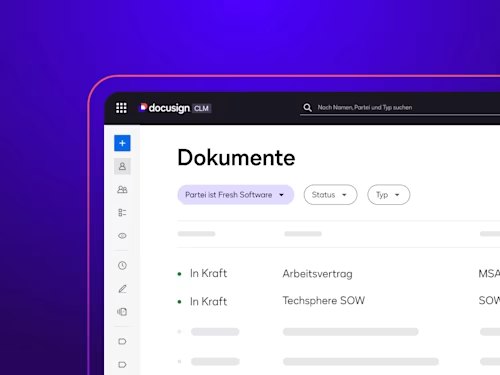
Alles zu Contract Lifecycle Management auf einen Blick!
Erfahren Sie, was sich hinter dem Begriff Contract Lifecycle Management verbirgt und welche Phasen es beim CLM gibt. Jetzt informieren.

Ob Leasingverträge, Lieferantenverträge oder Arbeitsverträge: Effektives Vertragsmanagement ist ein entscheidender Erfolgsfaktor für Unternehmen aller Größenordnungen. Verträge stellen die Basis sämtlicher geschäftlicher Transaktionen dar. Und dabei ist der gesamte Prozess im Blick: Ihr Lebenszyklus von der Angebotserstellung bis zur Vertragsunterzeichnung und Archivierung muss sorgfältig verwaltet werden. Hier kommt das sogenannte Contract Lifecycle Management (CLM) ins Spiel, ein entscheidender Ansatz für die digitale Vertragsverwaltung, der durch moderne Technologie unterstützt wird.
Was hinter CLM-Systemen steckt und warum sie so wichtig geworden sind, erfahren Sie hier.
Was ist Contract Lifecycle Management?
Stellen Sie sich das Vertragsmanagement wie einen Hausbau vor: Nach der Planungsphase brauchen Sie die passenden Gewerke und Handwerker und auch nach der Fertigstellung werden immer wieder Renovierungen oder Instandhaltungsmaßnahmen fällig. Der Contract Lifecycle Management (CLM) bezieht sich genau auf diesen Prozess, die Verwaltung und Optimierung eines Vertrags während seines gesamten Lebenszyklus, von der Vertragsanbahnung bis zur Vertragsbeendigung.
Betrachten Sie das System wie eine Mieterin oder einen Mieter, der Ihnen jedes Mal zuverlässig mitteilt, wenn etwas erneuert werden muss. Bleibt das Haus unbewohnt, wird es mit der Zeit verfallen und am Ende Mehrkosten verursachen. Ähnlich sieht es auch bei Verträgen aus, die nicht in ein System eingepflegt und möglicherweise vergessen werden.
Das Contract Lifecycle Management hält Sie hingegen immer auf dem Laufenden und hilft Ihnen dabei, den Überblick über alle Geschäfte und digitalen Verträge zu behalten.
Die Phasen des CLM-Prozesses
Vertragsanbahnung und Angebotserstellung: Die Vertragsanbahnungsphase ist der Ausgangspunkt des CLM-Prozesses. Hier werden potenzielle Geschäftsmöglichkeiten identifiziert sowie Angebote erstellt und verfeinert, um die Bedürfnisse aller Parteien zu erfüllen.
Verhandlungsprozess:
Nachdem ein Angebot akzeptiert wurde, tritt die Verhandlungsphase ein, in der die Details des Vertrags ausgehandelt werden. Dies umfasst die Festlegung von Konditionen, Preisen, Lieferbedingungen und anderen wichtigen Bestimmungen.
Vertragsunterzeichnung und Ausführung:
Sobald alle Parteien zufrieden sind, wird der Vertrag unterzeichnet und tritt in Kraft. Mit der
können Sie hier einen nahtlosen digitalen Prozess aufsetzen. Diese markiert den Beginn der Ausführungsphase, in der die Vertragsbedingungen umgesetzt und eingehalten werden müssen.
Vertragsüberwachung und -verwaltung:
Während der Laufzeit des Vertrags müssen die Vertragsbedingungen beobachtet und verwaltet werden. Dies umfasst die Verfolgung von Vertragsfristen, die Einhaltung von Compliance-Anforderungen und die Behandlung von Änderungsanforderungen.
Vertragsverlängerung, Beendigung und Archivierung:
Am Ende der Vertragslaufzeit wird der Vertrag entweder verlängert, wenn alle Parteien zustimmen, oder beendet. Dies kann auch den Prozess der Vertragsneuverhandlung oder -erneuerung beinhalten. Der abgelaufene Vertrag wird zur Aufbewahrung elektronisch archiviert.
Warum ist es sinnvoll, den CLM-Prozess mit einem System zu erfassen?
Die manuelle Verwaltung von Verträgen kann zeitaufwendig sein und zu Fehlern bzw. Lücken führen – insbesondere bei großen Mengen an bestehenden Verträgen. Hier kommen CLM-Systeme ins Spiel, die den gesamten Lebenszyklus eines Vertrags digital aufnehmen und verwalten. Durch den Einsatz von CLM-Software profitieren Unternehmen von folgenden Punkten:
Effizienz steigern:
Automatisierte Workflows und Vorlagen beschleunigen den Vertragsprozess und reduzieren manuelle Eingriffe, was zu schnelleren Abschlüssen führt.
Risiken minimieren:
CLM-Systeme ermöglichen eine optimale Überwachung von Vertragsfristen, Compliance-Anforderungen und weiteren Faktoren, was das Risiko von Vertragsverletzungen oder rechtlichen Problemen reduziert.
Kosten senken:
Durch die Optimierung des Vertragsmanagements können Sie unnötige Verzögerungen, Fehler oder unrentable Vertragsbedingungen vermeiden.
Bessere Transparenz und Kontrolle:
CLM-Systeme bieten einen zentralen Ort für die Speicherung und Verwaltung von Vertragsdokumenten, was eine bessere Transparenz und Kontrolle über den gesamten Vertragsbestand ermöglicht.
Was versteht man unter Contract Management?
Contract Management beschreibt die systematische Verwaltung von Vertragsbeziehungen zwischen Unternehmen und ihren Partnern. Eine professionelle Rechtsabteilung nutzt dabei modernste Technologien, um den gesamten Vertragslebenszyklus von Anfang bis Ende zu optimieren.
Die zuständige Abteilung arbeitet mit spezialisierten Tools wie Docusign CLM, um relevante Informationen zentral zu erfassen und Fristen zuverlässig zu überwachen. Durch die Integration von digitaler Unterschrift und automatisierten Workflows entstehen messbare Effizienzgewinne.
Moderne Contract Management Lösungen ermöglichen regelmäßige Audits und eine revisionssichere Archivierung. Mit standardisierten Textbausteinen und umfassenden Funktionen zur Vertragserstellung profitieren Unternehmen von kontinuierlichen Verbesserungen ihrer Vertragsprozesse.
Was versteht man unter Lifecycle Management?
Lifecycle Management strukturiert den gesamten Zyklus eines Vertrags von der ersten Idee bis zur Archivierung. Die zugehörigen Dokumente und E-Mails werden dabei zentral verwaltet und mit allen Beteiligten geteilt. Vom ersten Entwurf bis zur finalen Version durchläuft jeder Vertrag definierte Schritte.
Ein wesentlicher Vorteil moderner CRM-Systeme wie Docusign CLM liegt in der automatisierten Verwaltung dieser Aufgaben. Das System erinnert Sie an wichtige Termine, unterstützt bei der Dokumentenerstellung und ermöglicht eine nahtlose Zusammenarbeit aller Abteilungen.
Mit Docusign CLM behalten Sie den Überblick über den kompletten Vertragsbestand und können Geschäftsprozesse deutlich beschleunigen. Die Software passt sich dabei flexibel an Ihre individuellen Anforderungen an und wächst mit Ihrem Unternehmen.
Docusign CLM - die Software für Ihr Unternehmen
Contract Lifecycle Management erleichtert den gesamten Lebenszyklus und hilft dabei, Ihre Verträge zu verwalten und auf den neuesten Stand zu bringen. Durch die Digitalisierung von Verträgen und die Nutzung elektronischer Signaturen können Unternehmen den Weg zu einer agileren und wettbewerbsfähigeren Vertragsverwaltung einschlagen. Mit sicherer Identitätsverifikation und der Einhaltung der eIDAS-Verordnung bietet Docusign umfassende Lösungen für modernes Vertragsmanagement.
Ähnliche Beiträge
Docusign IAM ist die Vertragsplattform, die Ihr Unternehmen braucht



